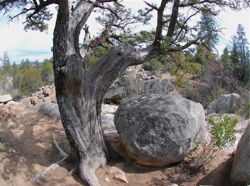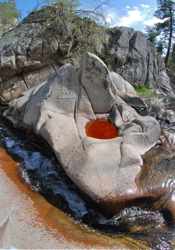Life Purpose, Part 4: The Comfort Trap

When the idea of Life Purpose arises, the first thing that pops up for quite a few people is terror that Life Purpose will take them away from all they know and love. Since I began this series I have heard several versions of the following:
 “What if once I get healed or discover my Life Purpose I find that I can no longer tolerate my _________.”
“What if once I get healed or discover my Life Purpose I find that I can no longer tolerate my _________.”
(Fill in the blank. Spouse? Job? Residence? How I allow myself to be treated? All of the above?)
This is a fascinating question. What we’ve got here looks like this:
I am unhappy with my circumstances. I think maybe I should be doing something else because I cannot fully value what I’m doing. But I don’t want to do anything that would take me away and I’m afraid to make any changes.
Sometimes we don’t change unless the terror and discomfort of remaining the same are worse than the terror of change. Either/or thinking and imagination about the future are usually at the root of this fear. “I must either endure this forever or leave (totally, suddenly, and without preparation, into the unknown).”
Unhappiness comes largely from resisting where we actually are. We get happier with our circumstances by investing in them fully and using them to grow.
Instinctively know we need to be willing to surrender attachment to forms and circumstances to be spiritually free. This does not mean that it is spiritual to leave the entangled life web we have weaved. Sinking in is a more effective way to become free. This is done by becoming Present and authentic, and seeing where things go.
What about surrendering to your current circumstances with the sincere Purpose of resolving your issues there? You will either transform your relationship to your life so you’re happier, or gradually work through it to the point of freeing yourself from it without trauma.
Time is ticking ticking ticking. If you use up your life avoiding being Present where you are you are literally giving up your life. Is this situation you say you do not like worth your life?
You will need to face your current discomfort, moment by moment, and make some real responses to it if you want a happier life. Terrifying yourself with being trapped in your circumstances or floundering without them is not the real issue. The real issue is that your fear of discomfort keeping you stuck. You will be MORE comfortable if you address your discomfort. But you need to FEEL it to address it.
Staying the same is not actually comfort—it is familiarity. Discern the difference between familiarity and comfort. This will help free you from fear of change.
Fortunately, when we tune in to our core authenticity and become loyal to ourselves, our relationship with ourselves forms a steadfast and absolutely familiar basis of operation that remains with us no matter how circumstances change. This core self forms and informs our relationships, through our loyalty to ourselves within these relationships. Thus we become more and more comfortable in our relationships as we become true to Self.
with ourselves forms a steadfast and absolutely familiar basis of operation that remains with us no matter how circumstances change. This core self forms and informs our relationships, through our loyalty to ourselves within these relationships. Thus we become more and more comfortable in our relationships as we become true to Self.
The act of trying to be somebody other than we are makes us unhappy. Here is the most common regret of all at the end of life:
“I wish I’d had the courage to live a life true to myself, not the life others expected of me.”
Being loyal to yourself is prerequisite to Life Purpose. If you’re not there yet, becoming loyal to yourself can BE your Life Purpose. We have more than one.
We grow and morph as we accumulate life experience. Being integrated and healthy involves making the adjustments necessary to infuse our current values into daily life. Change can come about gradually and gracefully. Huge changes, if essential, can occur with preparation, foresight, and collaboration with those we love.
What do you tell yourself about Life Purpose?
Could it be that my circumstances actually support me in that Purpose?
Could it be that taking on what I am resisting and having difficulty with is a part of my Purpose?





























